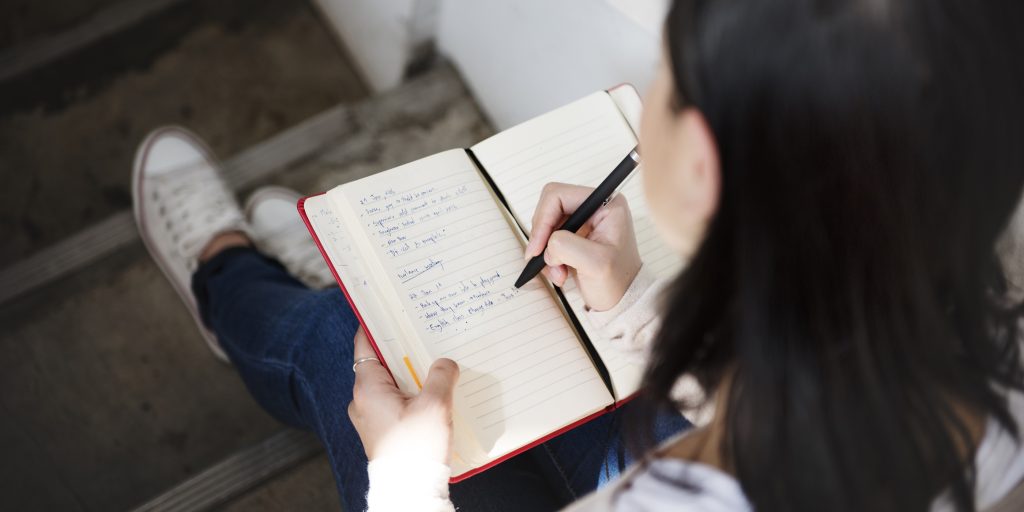
When I was in my 20s, I was fulfilled. I worked hard, and I was achieving many of my goals– even if slowly and painfully–so I wanted to understand why I was anxious so much of the time. I knew I felt disconnected from a spiritual practice, and I wanted to find a way to search for a connection that felt realistic to me.
My therapist asked me to start keeping a journal and gave me some prerequisites: Write in it around the same time every evening and answer a short checklist of questions each time. My questions were:
What happened today that was hard?
How did I handle it, and how do I feel about that now?
When did I slow down today and feel connected to the spirit? What did that look and feel like?
What am I worried about right now?
What am I happy about right now?
Simple questions, often answered in a single sentence. I’d whip out my journal after dinner and take a look backward over the day. At first, I didn’t feel like it was changing anything. Over time, as a few months passed, I noticed something: the questions were creeping into my daily awareness, and helping me in the moment, instead of just helping me to reflect afterward.
I found that I’d be in the middle of something difficult, say, a slight argument with my sister, and the journal would pop into my mind. I’d think, “How can I slow down right now, and what would I wish I’d done when I’m writing this down, later?”
I also found myself reminded of the connections possible throughout the day. Like a gentle alarm clock, I’d think “Oh, this is happening now!” when I’d feel connected to the spirit. It could be listening to a song while driving, it could be the feel of the sun on my back while I held my son’s hand, it could be the untouchable feeling of unexpected comfort while crying.
Journaling made me aware of what was already happening, but which I passed by with my racing mind. Answering the same questions night after night could get boring or annoying, but the repetition served an important purpose. Emotional and spiritual clarity have long been achieved through repetition, through something as formal as my husband’s Catholic grandmother praying the rosary or something as informal as meditative chants every sunrise.
Another aspect of journaling that became important to me was the ability to go back and read what I had been thinking, doing, and feeling months ago, or as time went on, even a year ago. I remember the first time I sat down and read from page one to wherever I was at that time in my journal; I had more than one moment of realization as I saw my patterns emerge: the habits that were hurting or helping me, the ways I sabotaged my own spiritual life, and the choices that supported a calm and anxiety-free existence. I saw that when I chose to handle stressful situations by clamming up and becoming silent, I suffered greatly over time. Not speaking up or setting boundaries led directly to anxiety. I couldn’t see this in my daily life, but through reading my journal, I could see it there in black and white.
I also saw how the more I looked for spiritual connections in my daily life, the more my anxiety was reduced. The acts of helping someone else, of making amends, of making progress in my character defects all contributed to calmer waters, a more peaceful life.
Journaling didn’t so much change my life as reveal it. In seeing what was already there, I felt empowered and more at peace.
Originally published on March 16, 2017.